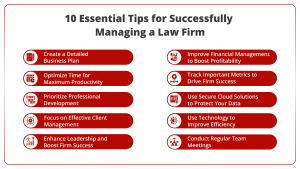Starting a law firm is one challenge, but keeping it running efficiently comes with challenges, from meeting client expectations to keeping up with the latest legal regulations. Here are some eye-opening stats that show just how challenging the legal industry can be:
- Client Retention: Only 60% of law firms feel confident in their retention strategies.
- Technology Adoption: 14% of law firms cite difficulties in adopting new technology, which affects efficiency and client satisfaction.
- Financial Pressure: 53% of law firms report facing an impending crisis due to a shortage of support staff, which increases operational costs and puts pressure on existing resources
- Productivity Concerns: On average, attorneys in small firms bill only 2.5 hours of an 8-hour workday.
These elements are essential to keeping your clients happy and ensuring your firm runs smoothly and grows.
Why does this matter? Because the success of your law firm depends on how well you handle the big picture and the daily details. Let’s dive into ten essential tips to help you manage a law firm and use the best tools and practices, setting you up for success in the competitive world of law.
Understanding Law Firm Management
Law firm management involves overseeing a law firm’s administrative and operational functions or legal practice. Here’s a breakdown of what this involves:
- Operational Oversight: Managing the day-to-day activities and ensuring the office runs smoothly.
- Financial Management: Handling budgeting, payroll, billing, and other financial aspects to keep the firm financially stable.
- Staff Management: Overseeing the recruitment, training, and distribution of work among staff to maximize efficiency.
- Policy Implementation: Developing and enforcing office policies and procedures to standardize operations.
- Marketing and Business Development: Promoting the firm’s services to attract and retain clients.
- Legal Compliance: Ensuring all practices adhere to legal standards and ethical guidelines.
Effective management is crucial for a law office’s success, enhancing its ability to deliver high-quality legal services efficiently.
10 Essential Tips for Successfully Managing a Law Firm
Firms that nail their management practices tend to be significantly more profitable. Here are 10 essential tips on managing a law firm that will help streamline your operations and boost your bottom line.
1. Create a Detailed Business Plan
A comprehensive business plan must set your law firm on a path to success. It serves as a roadmap, aligning your team with the firm’s goals and detailing how to achieve them. Here’s how you can craft a business plan that resonates with every member of your team:
Essential Elements of Your Law Firm’s Business Plan:
- Plan your finances by projecting your income and outlining expected expenses. This keeps everyone aware of the firm’s financial health and priorities.
- Develop and refine marketing approaches based on an in-depth analysis of your target market and competitors.
- Define everyone’s roles clearly to streamline operations and ensure everyone knows their responsibilities.
- Set specific, quantifiable targets for client engagement, case outcomes, and financial achievements.
Ensure each team member knows how their role supports the firm’s goals. Keep the business plan dynamic by regularly revisiting and tweaking it based on actual performance and market changes.
2. Optimize Time for Maximum Productivity
Effective time management is crucial for any law firm to boost productivity, and here are some practical strategies to help you maximize every minute.
Establish a Task List
- Start your day with a well-organized task list. This will be your roadmap, keeping you focused and on track.
- Designate specific times for checking and responding to emails. This helps you avoid multitasking, which can split your attention and reduce effectiveness.
- Maintaining a clean and orderly desk creates a clutter-free environment that fosters clear thinking and concentration.
Prioritize Tasks
Create a detailed list of all tasks that need your attention, categorizing them by urgency and importance.
- Urgency: Pinpoint which tasks need immediate action.
- Importance: Evaluate which tasks are crucial for meeting your long-term goals.
First, tackle the most urgent and vital tasks. Then, delegate less critical functions to the right team members. This streamlines your workload and empowers your team by involving them more deeply in daily operations.
3. Prioritize Professional Development
Here are actionable tips to effectively foster professional development:
Continuing Legal Education (CLE)
Encourage and facilitate participation in CLE programs to keep your team up-to-date with legal advancements and compliance requirements.
Organize regular training workshops to address specific legal skills or emerging legal issues relevant to your practice area.
Mentorship Programs
Less experienced lawyers are paired with seasoned mentors within the firm to promote knowledge sharing and professional growth.
Implement a structured feedback system within the mentorship program to help mentees progress and develop specific competencies.
Technology Training
To increase efficiency and service quality, provide training on the latest legal technologies, such as case management software, e-discovery tools, and legal research platforms.
Keep the team updated with regular sessions on new features and best practices for the tech tools utilized by the firm.
4. Focus on Effective Client Management
Adopting a comprehensive method can improve operations and strengthen client relationships. Here’s how you can personalize and enhance your approach to managing clients:
- Select clients with well-grounded expectations and a solid understanding of the legal process to ensure a harmonious working relationship.
- Set up strict policies to safeguard client data and ensure compliance with privacy regulations.
- Schedule meetings well ahead of time to maximize your and your clients’ schedules, boosting satisfaction and efficiency.
- Establish clear communication guidelines, including how quickly to respond and preferred methods of communication, to ensure consistent and professional interactions.
- Establish a regular feedback collection system, allowing you to fine-tune your services and promptly address any client concerns.
- Make sure all billing processes are transparent and communicated from the start of client interaction to prevent misunderstandings and build trust.
5. Enhance Leadership and Boost Firm Success
As a leader, you set the tone for your team’s behavior and the overall direction of your operations. Here’s how you can enhance your leadership approach to promote a positive and productive work environment:
- Clearly articulate your firm’s long-term goals and strategic direction. This clarity helps everyone understand the firm’s objectives and their role in achieving them.
- Regularly communicate your vision in meetings and through internal communications to keep everyone aligned and engaged.
- Be open to modifying your strategies as new information and opportunities arise. Keeping your team informed about these changes ensures everyone remains on the same page.
Stay attuned to shifts in the legal market and broader economic conditions. Being proactive about these changes can turn potential challenges into opportunities. Listen to feedback from your team. Often, valuable insights come from those executing day-to-day operations. This can also include adapting to feedback and ideas that may initially seem unconventional.
6. Improve Financial Management to Boost Profitability
Many firms struggle with maintaining a clear view of their financial health, which can hinder their ability to make informed decisions and spot crucial trends. Here’s how to get a better handle on your firm’s finances:
- Ensure all partners can access essential data, such as client lists. This information should be readily available, not buried in files or databases.
- It’s vital to work within a fixed budget and make accurate revenue forecasts for the firm and individual practice areas. This helps in planning and allocating resources more effectively.
7. Track Important Metrics to Drive Firm Success
Success in any law firm goes beyond setting goals; it requires actively measuring progress. As the saying goes, “You can’t improve what you don’t measure.” You clearly understand how well your firm is performing by tracking relevant Key Performance Indicators (KPIs) like client acquisition, client satisfaction, and monthly revenue.
Financial KPIs to Monitor
|
For example, if you notice client satisfaction scores dropping, you can investigate the root cause and implement strategies to enhance client service. Monitoring these metrics allows you to make smarter, data-driven decisions that continuously improve your firm’s performance.
8. Use Secure Cloud Solutions to Protect Your Data
Cloud storage stands out for its effectiveness in managing your law firm’s security. However, it’s vital to select a secure platform. Ensure your chosen cloud service—like Amazon Web Services—offers comprehensive access controls, allowing data access strictly to authorized users. Also, verify the provider’s disaster recovery options and physical security measures, such as keycard access, to protect your information. These steps will help maintain the integrity and confidentiality of your sensitive data.
9. Use Technology to Improve Efficiency
The 2023 Legal Trends Report highlights a significant revenue boost for law firms that have integrated technology into their operations. Legal professionals have seen an increase of nearly 75% in revenue, underscoring the effectiveness of digital tools in enhancing productivity and financial performance.
Use technology to streamline your firm’s operations. Implement case file organizers, time-tracking tools, and billing software to manage files efficiently, accurately record billable hours, and simplify payment processes. Leveraging AI for client communication can also increase productivity, allowing lawyers to focus on higher-priority tasks.
10. Conduct Regular Team Meetings
Hold consistent team meetings to address complex issues and collaboratively find solutions. These meetings are crucial for fostering strong relationships and promoting teamwork, which is vital for navigating the unique challenges of the legal industry and improving overall firm performance.
Practical Tools to Optimize Law Firm Operations
As you manage your law firm, embracing technology can profoundly transform how you handle daily operations and interact with clients. Here is how you can utilize various tools to streamline processes and improve management.
Calendar and Scheduling Tools
Google Calendar is a popular choice due to its simplicity and integration features, making it easy to manage appointments, court dates, and deadlines. For more advanced scheduling needs, tools like Calendesk offer business-oriented solutions ideal for managing client consultations and internal meetings. These platforms provide features that go beyond basic scheduling, helping law firms stay organized and efficient.
Task Management Software
Trello is a project management tool that organizes tasks using boards and cards, making tracking projects by client or case easy while encouraging team collaboration. Todoist offers an intuitive task list system for a simpler approach, helping attorneys prioritize daily activities and sync with other tools like Google Calendar.
Efficient Cloud Storage
Google Drive, Dropbox, and Microsoft OneDrive are secure and accessible options for cloud storage. They allow you to easily access your documents from anywhere and share them with clients or team members. Organizing files by client, case, or date can keep your practice meticulously organized.
Billing and Financial Management Software
QuickBooks is a popular financial tracking and billing tool that seamlessly integrates with many legal practice management systems. With its user-friendly features, FreshBooks is ideal for small to mid-sized firms, handling invoicing and financial reporting with ease. TimeSolv offers precise time tracking and billing for law-specific needs, helping your firm manage finances and bill clients accurately.
Automating Routine Tasks
Legal practice management software like Clio or MyCase automates essential tasks such as time tracking and billing, helping your firm reduce manual workload. Consider using automation tools that can streamline your processes by connecting apps and automating tasks like filing email attachments into the correct folders, saving your firm valuable time and effort.
eSignature Capabilities
Using software like DocuSign or HelloSign, your firm can easily integrate eSignature tools into your document management process. This enables clients to sign and return documents quickly, reducing delays. Once signed, the documents are automatically attached to the relevant case file, ensuring a seamless and efficient workflow.
Conflict Checking with Full-Text Search
Software like Clio and PracticePanther offer robust conflict-checking features. They utilize full-text search to scan client records and case information quickly. This ensures accurate and timely conflict checks, helping your firm stay ethically compliant without wasting non-billable hours on manual searches.
Implementing these technologies simplifies your workload and enhances your ability to focus on more strategic and complex legal issues, leading to better client service and more successful practice.
Integrating CLEs into Your Firm’s Development Strategy
While implementing effective management strategies is crucial for the success of your law firm, it’s equally important to ensure your team stays legally proficient and up-to-date. This is where Continuing Legal Education (CLE) comes into play. Regular CLEs not only keep your team compliant with legal standards but also enhance their skills, keeping your firm competitive and knowledgeable.
However, traditional CLE opportunities can be time-consuming and may not always fit well with the busy schedules of practicing attorneys. This is where Destination CLEs offers a revolutionary approach—combining the necessity of CLE with the allure of vacation settings. By choosing Destination CLEs, you provide your team with a unique way to fulfill their educational requirements while also enjoying a much-needed break, revitalizing their spirits and boosting their productivity upon return.
Explore, Learn, Grow: Secure Your Spot at Destination CLEs
Destination CLEs redefine the way legal professionals meet their continuing education requirements. Our conferences blend educational opportunities with cultural immersion in some of the world’s most captivating cities.
Why Choose Destination CLEs?
- Meet CLE Requirements: Fulfill your mandatory CLE credits through engaging, high-quality seminars in stunning global locations.
- Transformative Learning: Turn the usual lecture-based learning on its head by engaging in sessions as dynamic as the destinations.
- Networking Opportunities: Connect with peers worldwide, expanding your professional network in settings that encourage collaboration and growth.
- All-Inclusive Experience: Enjoy comprehensive packages that cover educational sessions, accommodations, and unique cultural experiences, making your learning adventure seamless and memorable.
- Efficient Credit Earning: Earn required CLE credits efficiently, with schedules that balance professional development and exploration.
Plan your next educational journey with Destination CLEs and ensure extraordinary professional development. Our 2024-2025 lineup includes diverse locales such as Lisbon, Puerto Vallarta, Dubai, Havana, and an Alaska Cruise—each offering a distinct blend of legal education and local culture.
Secure your spot today and become part of a community dedicated to professional growth and networking.
DestinationCLEs.com is a participant in the Amazon Services LLC Associates Program, an affiliate advertising program designed to provide a means for sites to earn advertising fees by advertising and linking to Amazon dot com.











